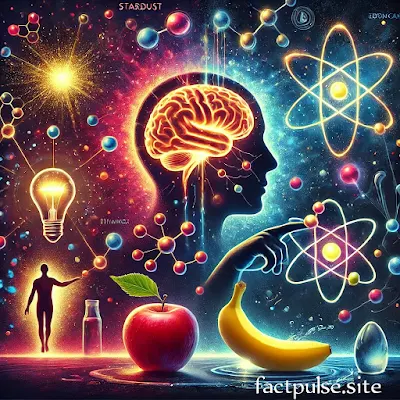The Science of Everyday Life: 15 Amazing Facts That Will Blow Your Mind
Science is all around us, shaping the way we live, work, and interact with the world. From the moment we wake up to the time we go to bed, science influences our everyday activities in ways we often take for granted. This article explores 15 amazing scientific facts that highlight the wonders of our daily lives. These facts are presented in simple, easy-to-understand language to make learning fun and engaging. Let's dive in!
1. Your Body Contains Stardust
Did you know that the elements in your body, such as carbon, nitrogen, and oxygen, were formed in stars billions of years ago? When massive stars exploded as supernovae, they scattered these elements across the universe, eventually forming our solar system and, later, you! In a way, we are all made of stardust.
2. Your Brain Generates Enough Electricity to Power a Light Bulb
The human brain produces about 20 watts of electricity. This is enough to power a small LED light bulb. This electrical activity is what allows neurons to communicate with each other, enabling you to think, feel, and move.
3. Water Can Boil and Freeze at the Same Time
This phenomenon, called the "triple point," occurs when temperature and pressure are just right for water to exist in all three states — solid, liquid, and gas — simultaneously. It’s a rare but fascinating demonstration of physics.
4. Your Heart Beats Over 100,000 Times a Day
On average, the human heart beats around 100,000 times daily, pumping about 2,000 gallons of blood. This constant activity keeps oxygen and nutrients flowing to every part of your body.
5. Bananas Are Naturally Radioactive
Bananas contain potassium-40, a radioactive isotope of potassium. While the levels of radiation are extremely low and completely harmless, it’s an interesting fact that ties nutrition to nuclear science.
6. You Shed Millions of Skin Cells Daily
Your body sheds about 30,000 to 40,000 skin cells every minute, which adds up to nearly 50 million cells a day. This natural process helps keep your skin healthy and regenerating.
7. Soap Doesn't Kill Germs; It Removes Them
Contrary to popular belief, soap doesn’t kill germs. Instead, it breaks down the oils and dirt on your skin, making it easier to rinse germs away with water. This is why proper hand washing is so important.
8. The Air You Breathe Is Mostly Nitrogen
Although oxygen is essential for life, it only makes up about 21% of the air. The majority, approximately 78%, is nitrogen, which plays a crucial role in the Earth’s ecosystem.
9. Microwaves Heat Food by Vibrating Water Molecules
Microwave ovens use electromagnetic waves to make water molecules in food vibrate. This vibration generates heat, which cooks your food quickly and efficiently.
10. Your Bones Are Stronger Than Steel
When compared to steel of the same density, human bones are about five times stronger. They can withstand significant pressure, making them an incredible feat of natural engineering.
11. The Color You See Is a Reflection
The colors we see are the result of light waves bouncing off objects. For example, a red apple appears red because it reflects red light waves and absorbs all others.
12. Plants Can Communicate With Each Other
Plants release chemicals into the air to warn neighboring plants of danger, such as pests. This chemical signaling helps them prepare their defenses, a fascinating example of nature’s teamwork.
13. Hot Water Freezes Faster Than Cold Water
Known as the Mpemba effect, this counterintuitive phenomenon occurs under certain conditions. While scientists are still investigating why, it’s thought to involve differences in evaporation and convection.
14. The Human Body Glows
Your body emits a faint light, known as bioluminescence, but it’s about 1,000 times weaker than what the human eye can detect. Specialized cameras can capture this glow, revealing a unique aspect of human biology.
15. Gravity Is Weaker Than You Think
Despite holding us to the Earth’s surface, gravity is the weakest of the four fundamental forces in nature. Electromagnetism, for example, is vastly stronger but operates on a much smaller scale.
Conclusion
Science is not just a subject in textbooks; it’s a part of our everyday experiences. From the stars that created us to the invisible forces shaping our world, these 15 amazing facts remind us of the incredible complexity and beauty of life. By understanding these scientific marvels, we gain a deeper appreciation for the world and our place in it.
The next time you turn on a light bulb, eat a banana, or simply breathe, remember that science is working behind the scenes, making life possible and endlessly fascinating. Keep exploring and stay curious—there’s always more to learn!







0 Comments